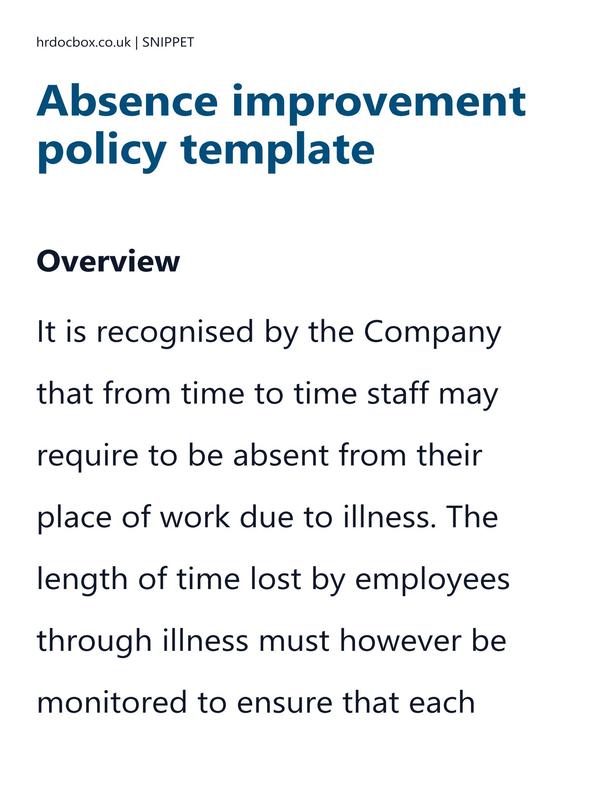Absence improvement policy template


Our Absence Improvement Policy template is designed to support a healthier work environment by helping you to combat absenteeism, ensure fairness, and boost productivity.
- Includes Absence improvement policy template, plus 12 months’ access with all updates provided free of charge and notified to you.
- UK-specific accuracy.
- 770 words over 3 pages.
- Last updated 03/09/2025.
- Format: Word / plain text / email.
- Delivery: Instant download after purchase (no physical item).
- Access: Download link shown here after checkout.
- This Absence improvement policy template will SAVE you up to 1 hour 30 mins drafting & research. Save cost. Reduce risk.
Absence improvement policy
1 Overview
1.1 It is recognised by the Company that from time to time staff may require to be absent from their place of work due to illness. The length of time lost by employees through illness must however be monitored to ensure that each member of staff is able to do their job, effectively and without putting themselves or others at risk. It is not the intention of the Company to penalise the genuinely sick, however it must be recognised that an employee who is medically unfit to carry out his/her contractual duties may not be able continue in employment.
2 Scope
2.1 This policy is applicable to all employees of [company name].
3 General principles
3.1 Managers will consider cases of sickness absence on an individual basis and ensure the provision of appropriate support, advice and Occupational Health / Company Approved Doctor input where appropriate. However, it is recognised that in some cases, patterns/levels of absence will be unacceptable and formal management action will be required.
3.2 Employees who become aware that they have an illness problem are encouraged to inform their manager at the earliest opportunity. All such requests will be dealt with as speedily and compassionately as possible.
3.1 Stages
On return from absence all employees must be interviewed by their immediate line manager. At this interview the employee and the line manager must complete a Return to work interview form agreeing the reason for the
This is a 30% preview of the Absence improvement policy template. For instant full access, purchase this item or a parent bundle.
Absence improvement policy template purpose
The Absence Improvement Policy is a foundational document designed to address and manage employee absenteeism effectively. This policy outlines clear procedures and expectations regarding attendance, providing a framework to support employees facing recurring absences. It aims to identify the root causes of absenteeism, offer support mechanisms, and establish a structured approach for managing and improving attendance.
This policy typically includes guidelines for reporting absences, defining acceptable reasons for leave, and implementing supportive measures such as return-to-work interviews or access to support services. It also outlines progressive steps in managing frequent or prolonged absences, ensuring consistency and fairness in addressing absenteeism issues. By setting out a structured approach, this policy promotes a proactive response to absenteeism, aiming to foster a culture of accountability and support among employees.
The Absence Improvement Policy serves as a tool for promoting consistent attendance while acknowledging and accommodating genuine reasons for absence. It acts as a mechanism for organisations to engage with employees experiencing frequent absences, identifying challenges they may face and providing the necessary support to facilitate attendance improvement. Ultimately, this policy aims to strike a balance between supporting employees' well-being and maintaining productivity within the workplace.
Practical application of a Absence improvement policy template
- Issue the Absence improvement policy template during onboarding / after changes / planned refresher.
- Send it to appropriate internal recipients such as employees, workers, contractors etc. and request confirmation that is has been read and understood.
Compliance
Compliance
This Absence improvement policy template incorporates relevant UK laws and HR standards, including those listed below:
-
Employment Rights Act 1996: Provides the framework for handling statutory leave entitlements, promoting work-life balance.
-
Health and Safety at Work etc. Act 1974: Requires employers to maintain a safe working environment, reducing absences due to accidents and injuries.
-
Equality Act 2010: Ensures fair treatment of employees, addressing absence issues while accommodating disabilities.
-
Flexible Working Regulations 2014: Allows employees to request flexible working arrangements, potentially improving attendance.
-
Trade Union and Labour Relations (Consolidation) Act 1992: Recognises employees' rights to time off for trade union activities, fostering engagement.
-
Time off for Dependants: Enables reasonable time off for emergency situations concerning dependants, showing compassion.
-
Employment Equality (Age) Regulations 2006: Prevents age-based discrimination in absence management, promoting fair treatment.
-
Statutory Sick Pay (SSP) Regulations 1982: Outlines employees' rights to receive statutory sick pay, providing support during illness.
-
Statutory Paternity Pay and Leave: Offers paternity pay and leave entitlements, supporting employees during family events.
-
Disability Discrimination Act 1995 (now part of Equality Act 2010): Requires reasonable adjustments for disabled employees, aiding attendance.
Absence improvement workflow
Absence improvement workflow
Check which resources should be implemeted before and/or after the Absence improvement policy template, to understand the workflow.
Managers guide to absence improvement
Our absence improvement guide offers insights and strategies for improving employee attendance and reducing absenteeism.
Frequently Asked Questions about a Absence improvement policy template
Frequently Asked Questions about a Absence improvement policy template
-
Can I use the Absence improvement policy template in my small business?
Yes. The Absence improvement policy template is designed to be flexible and suitable for organisations of all sizes, including small businesses and charities. It follows UK employment law best practice, so even if you don't have an in-house HR team, you can confidently apply it.
-
Is the Absence improvement policy template compliant with 2026 UK employment law?
Absolutely. Like the Absence improvement policy template, all of our templates are drafted with the latest ACAS guidance and UK employment legislation in mind. We review and update them regularly, so you can be confident they remain compliant.
-
Can I customise the Absence improvement policy template for my organisation?
Yes, we highlight the areas of the Absence improvement policy template that you need to update with your own details, and where you need to make decisions to suit your situation. This saves you time and ensures that you meet best practice.
-
Do I get instant access to the Absence improvement policy template?
Yes. Once purchased, you'll be able to download the Absence improvement policy template instantly. Templates are provided in editable Word or Excel format so you can customise them easily, and in PDF format for easy sharing.
-
What if I need more help, not just a Absence improvement policy template?
If you're looking for broader support, we also offer toolkits and library bundles that include the Absence improvement policy template, along with other HR templates and policies for fully managing your situation. These may be more cost-effective if you need deeper advice.
-
Why should I use this Absence improvement policy template, and not AI to generate it?
The risk of using a free AI-generated template 'without review' includes your legal exposure, missing context, and no awareness of the wider process, whereas purchasing the Absence improvement policy template from us mitigates that risk.
